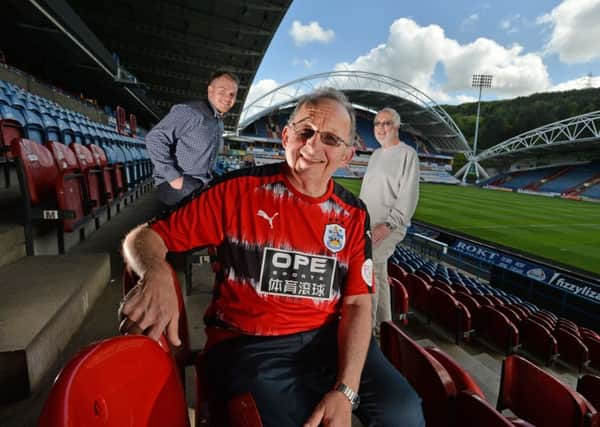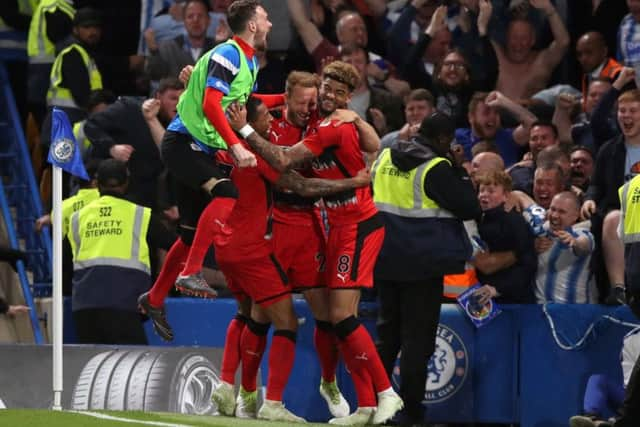Huddersfield Town's other survival battle: How fans saved their beloved club from extinction in 2003


The morning after being among the thousands of Huddersfield Town fans raucously celebrating their team confirming Premier League survival with a hard-fought draw against Chelsea, Stephen Booth is still in a state of disbelief.
Wearing his Huddersfield away shirt in the bar of the club’s training ground and recreation club Canalside, the 61-year-old says it had been a magical evening for the thousands of Terriers fans who travelled down to London for the night match. “The atmosphere from start to finish was just unbelievable,” he says. “When the final whistle went, it was bedlam.”
Advertisement
Hide AdAdvertisement
Hide AdBooth’s emotion about his beloved team’s against-the-odds triumph of staying up with the lowest wage bill in the richest league in the world is hardly surprising given he was one of the key figures in a very different survival battle 15 years ago - the fight over the very existence of the football club.


In 2003, the club came within moments of folding after racking up millions of pounds in debt and plunging through the divisions. But a group of fans, including Stephen, banded together to set up the Huddersfield Town Survival Trust to keep the club afloat until a new owner could be found. The very real prospect of the club being liquidated meant fans even registered the name of ‘AFC Huddersfield’ so they could restart again in the North East Counties League.
Joining Stephen at Canalside is Robert Pepper, former chairman of the survival trust. The 78-year-old did not make the Chelsea match and organised a bridge night instead in an attempt to escape the nerves but instead spent the evening checking his phone for updates from the game.
The pair say it is difficult to believe how far the club have come when they think back to the dark days of the late 1990s and early 2000s, when the club got itself £20m in debt unsuccessfully trying to secure promotion to the Premier League and two relegations followed in three years.
Advertisement
Hide AdAdvertisement
Hide AdStephen says: ““The club spent the 99/00 season chasing the Premier League dream and spent money we didn’t have on the basis of the ITV football deal. That went belly up and left the club £20m in debt. We struggled for three years going down the divisions and ended up in what is now League Two in 2002/03.


“We realised what the financial situation was like when we were top of what is now the Championship in 2000 and sold our star striker Marcus Stewart to Ipswich out of the blue. We didn’t even make the play-offs and they got promoted.
“You began to think there is something not right here. It was downhill from there, we had two relegations in three seasons.
“The club came within minutes of folding, it was really, really close. £20m is not a lot of money in the Premier League but it was huge given the state of the club then.”
Advertisement
Hide AdAdvertisement
Hide AdRobert adds: “They were desperate measures trying to raise money. They auctioned off the chance to be a player on the books - I know that because I won the auction!”
Things reached a head in 2002/03 where the club was unable to afford to pay its players for months. An initial attempt to sack manager Mick Wadsworth in January had to be scrapped as Town did not have the money to pay him off.
In spring 2003, Town fan Will Venters, an ITV Calendar journalist who died in 2012, got together a group of supporters to discuss what could be done to turn around the dire situation.
“Will could see what was happening and he got a few of us together who were members of the club’s Patron’s Association, including Peter Sargent, who is an insolvency practitioner,” Robert says. “We met in Peter’s kitchen on a Saturday morning to talk through what we might hopefully do. That was when we had the idea to form a supporters’ trust and called it a survival trust. The first thing we did was put together a little committee and ask for volunteers and Stephen came forward.”
Advertisement
Hide AdAdvertisement
Hide AdStephen was a businessman who ran his own catering firm but had extensive experience of organising fundraising events through his charity work, which had included the delivering of aid to Bosnia in the 1990s during the Balkans conflict. Bucket collections were held at matches, while charity nights were organised.
But just weeks after the trust was formed, a judge almost decided to liquidate the club in March 2003 - before a last-minute intervention persuaded him not to.
Robert says: “Peter Sargent went to the hearing when the club applied to be put into administration. The judge looked at the figures and was about to say it won’t work and was going to liquidate the club. But Peter passed him a note explaining it wasn’t as bad as it looked as it was mostly owed to former chairman Barry Rubery. He reversed his decision and put the club into administration.”
While the immediate danger had been averted, the club still desperately needed money. In the space of just three weeks, Stephen arranged a fundraising match with former Huddersfield players. Around 6,500 people attended the game, helping to raise £60,000 in the process. The organising of the match also had another positive effect. Stephen says: “The masterstroke was that we got one of the teams managed by Peter Jackson and the other by Terry Yorath. They had already been manager and assistant before but were dismissed when the club was chasing the Premier League dream. They came back after administration to take charge again for the following season. Through the summer, we used the money we raised to keep people in a job. The administrator was going to make all the back office staff redundant but we paid the salaries through the summer.”
Advertisement
Hide AdAdvertisement
Hide AdRobert explains: “The administrator said I haven’t got any money to keep the club running so we gave him what we had to keep the club afloat. The club was still in administration and different people were vying to take it on, but nothing was happening.”
Robert and Stephen put their normal working lives to one side during this period to concentrate solely on saving their beloved club. “For about four months, I didn’t earn a bean, I was totally focused on this,” says Robert, who was a self-employed IT worker.
Stephen’s wife ran their business while he also focused on the trust. It was agreed in June that businessman Ken Davy would become the new owner of the club, with Barry Rubery agreeing to forsake the £12.5m that was owed to him. But things were not that simple. “The deal was done round about the end of June but there was also a period between then and the night before the season started in August where there was an impasse between Ken Davy and the Football League,” Stephen says. “It was only 24 hours before the first game that the Football League agreed to let us rejoin the league.”
Huddersfield started training for the 2003/04 season with just four senior players but under the guidance of Yorath and Jackson, and a reliance on promising youth players, managed to secure an unlikely promotion from the bottom division via the play-offs.
Advertisement
Hide AdAdvertisement
Hide AdStephen says: “In May 2003, we had played Oldham and it looked like it could be the club’s last ever match. A player called Tony Carss scored for them. But the following season he was a mainstay in our team that won promotion.”
Once the future of the club was secured, the survival trust morphed into the Huddersfield Town Supporters Association after merging with an existing supporters club. The association is still running to this day with a new generation of fans joining the older heads.
Trust treasurer Alasdair Reid, 29, was at school at the time. “When I started supporting them, I would be happy with beating Macclesfield Town, let alone Manchester United,” he says. “I started properly going the season we started with four players because it was a quid a kid to get in. It was very rare to have a team of players from the local area because the club had no other choice. But people identified with that. Town fans have pride in the local area and being the underdog.”
The group say the trust has had a particularly good relationship with the club ever since Dean Hoyle took over as chairman in 2009.
Advertisement
Hide AdAdvertisement
Hide AdRobert says: “Dean is a massive figure for us. He came off the terraces to take over the club as he could see where it was going. He is a very wealthy, self-made man. He puts a lot of emphasis on the community and that is exactly what we are about as well.”
Stephen adds: “Compared to the late 90s when we chased the Premier League dream unsustainably, this time Dean Hoyle has chased it and achieved it sustainably.
“We have the lowest wage budget in the Premier League and we brought eight players last summer for the same price Manchester City paid for Kyle Walker, a normal Premier League full-back.
“This is a community club off the field and on it.”
As if to prove his point, midway through the conversation two of the heroes from the Chelsea game the night before, goalkeeper Jonas Lössl and goalscorer Laurent Depoitre, turn up at Canalside to continue their celebrations but are happy to chat to supporters and pose for pictures.
Advertisement
Hide AdAdvertisement
Hide AdStephen says there is a special bond between the players and the supporters at the club.
“In November, we had an event for the 79/80 team that won the Fourth Division Championship and most of the players came because they still felt an affinity with the club 40 years on. The current team will probably feel the same in future years. That is just the spirit of the club all the way through.”
Stephen, Robert and Alasdair are in agreement that being in the Premier League has had a major impact on the town.
“I started supporting Town in 1970, the last time we were in the top league,” says Stephen. “At the time, all our peers were wearing Town colours and it went away from that. In the 90s, all the children were in Bradford shirts when they got to the Premier League. But now the kids are wearing Huddersfield shirts again and hopefully they will be for the next 50 years.”
Advertisement
Hide AdAdvertisement
Hide AdIn addition to acting as a voice for supporters in an era of high ticket prices and £100m transfer fees, the trust is also involved in food bank collections and initiatives to get more women to matches. Robert says they hope to organise an event to mark the trust’s anniversary. “To see where we were 15 years ago and where we are now is absolutely magic.”
Battle for survival had echoes of 1919
Huddersfield are no strangers to fighting against the odds for survival - facing a similar battle almost a century ago.
Stephen says: “In 2003, people were saying what you are doing is a waste of time. But in 1919, the club went through a similar situation when Leeds City were expelled from the league and the city of Leeds tried to buy Huddersfield and move them to Leeds as a replacement.
“At the time, people went around Huddersfield town centre with buckets and keep the club afloat rather than having it move to Leeds and it worked.
“We didn’t learn the lessons of 1919 and went through it again in 2003. So it is important that trust is there to make sure we don’t go down that road again.”